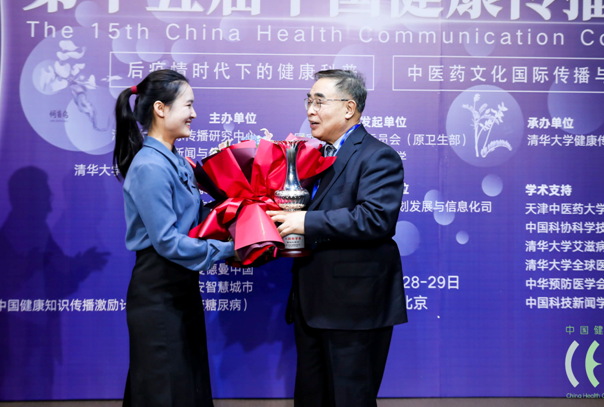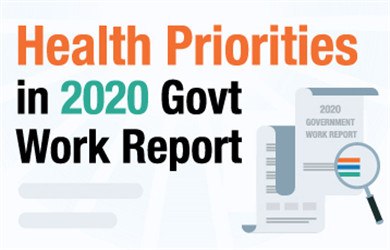Health conference urges public health education after COVID-19
China's health circles gathered at a forum to review the experience from the battle against the COVID-19 in Wuhan and tackle the problem of public health education after the pandemic.

Zhang Boli was presented with a bouquet by a student from Hubei province at the conference. [Photo provided to chinadaily.com.cn]
The China Health Communication Conference, initiated by Tsinghua University and the National Health Commission, kicked off its 15th edition at Tsinghua University , Beijing, on Saturday.
Zhang Boli, an academician with the Chinese Academy of Engineering and head of Tianjin University of Traditional Chinese Medicine, was honored as the "people's scientist" by the organizing committee for his contributions in the Wuhan battle.
Zhang, a traditional Chinese medicine expert and also recipient of the national honorary title for the same mission, led the research of the COVID-19 treatment scheme combining traditional Chinese medicine and Western medicine at the Wuhan front line.
Zhang said the award goes to all of those who had contributed their part in fighting for Wuhan and others all over the country acting to curb the spread of the virus.
To sum up the role of traditional Chinese culture in the battle, Zhang said the otherwise introverted and inward-looking traditional Chinese culture turns out to be ever powerful in crucial times when acting together with one aim. Zhang cited the lockdown of Wuhan as a great sacrifice for the city and its people to curb the virus from spreading.
The last COVID-19 patient in Wuhan was discharged on April 26, three months after the lockdown of the city, and China was the first country to resume normal life and production all over the COVID-19 affected world.
Along with the experience at the front line, the pandemic has aroused new thinking and challenges in public health after the pandemic outbreak. A survey released by the Edelman Trust Barometer on the conference indicates 84 percent of the Chinese ordinary public trusted that what the medical and health industry is doing is beneficial to the them in 2020, an increase of six percentage points over that in 2019 before the outbreak. However, lack of knowledge of the industry and health awareness is still a challenge of public health education in the long run.
During the pandemic control period in China, excessive disinfection and proper use of masks were two of the most common problems among the ordinary public.
A special survey on the immune health of Chinese career women was launched at the conference to get a picture of the group's knowledge of immune health and give guidance accordingly to better improve women's immune systems after the pandemic.
Conducted by the Center for International Communications Studies of Tsinghua University and Blackmores Institute under Australia-based health supplements maker Blackmores Ltd, the survey covered 1,000 career women aged between 20-59 and the result will be released in the form of green paper in 2021.


